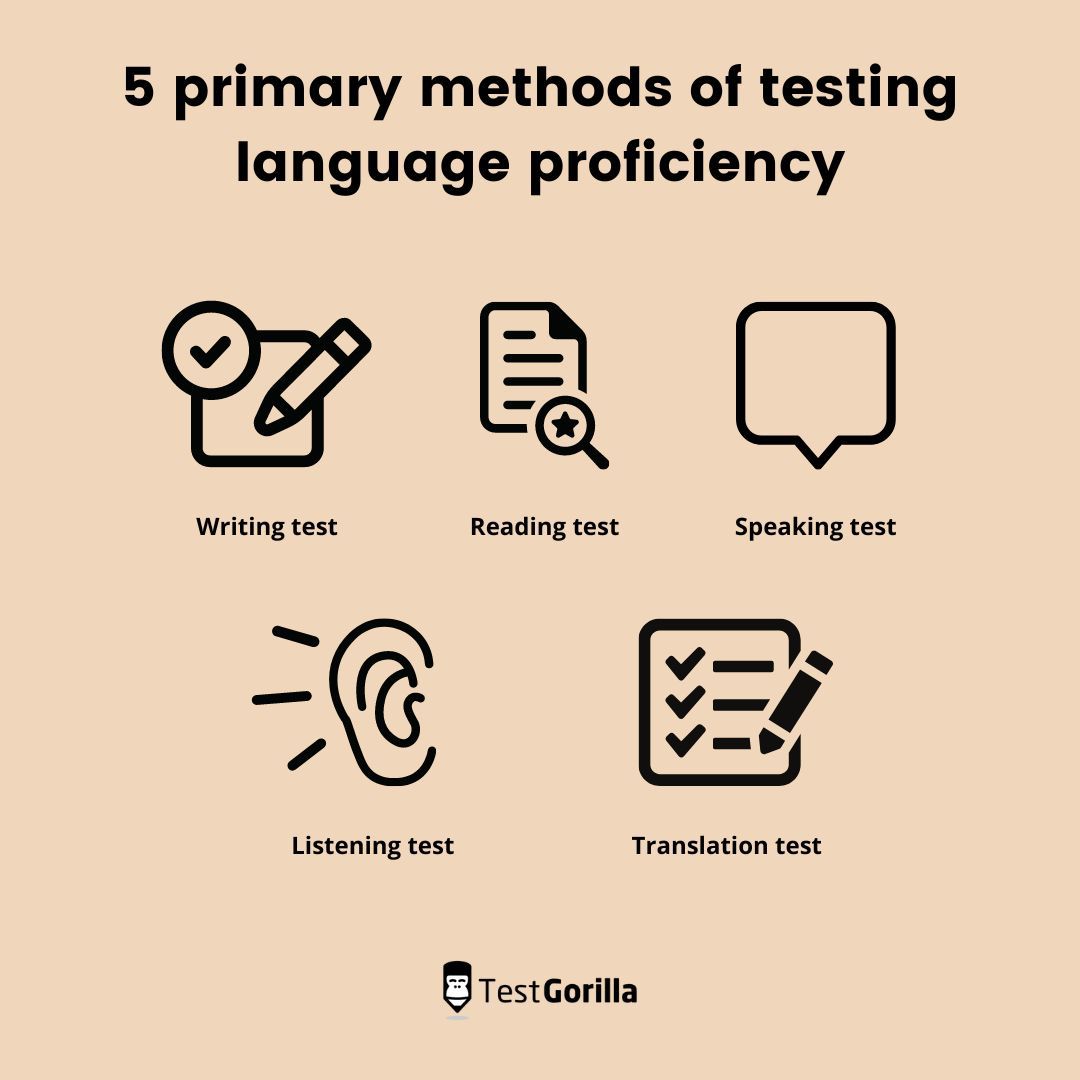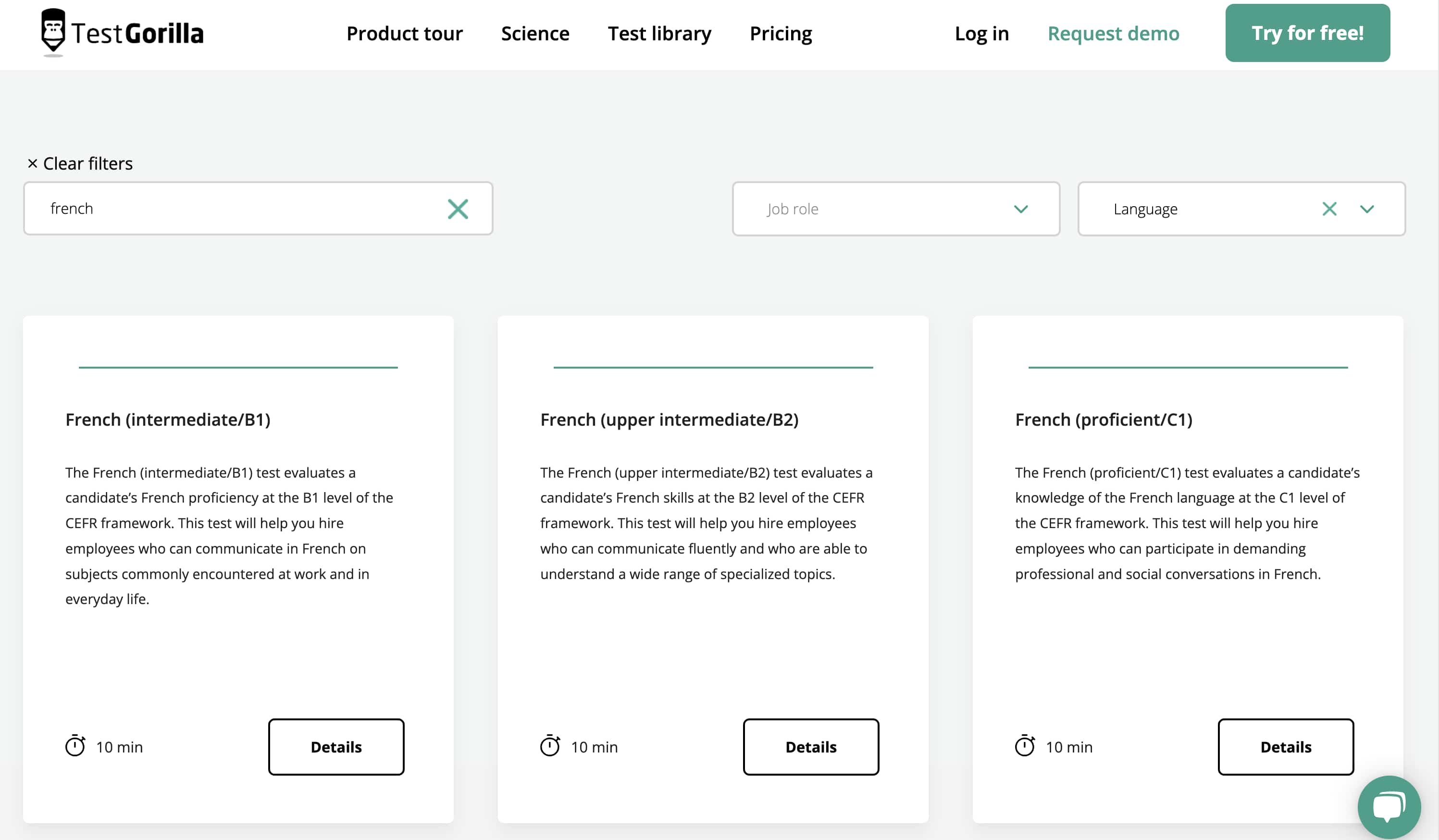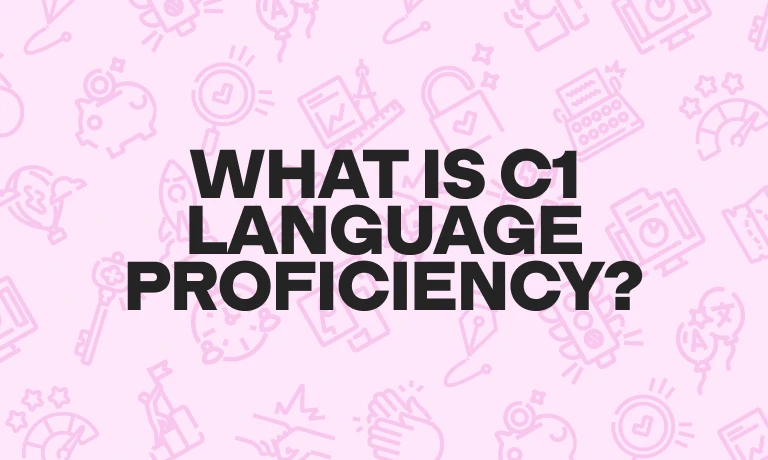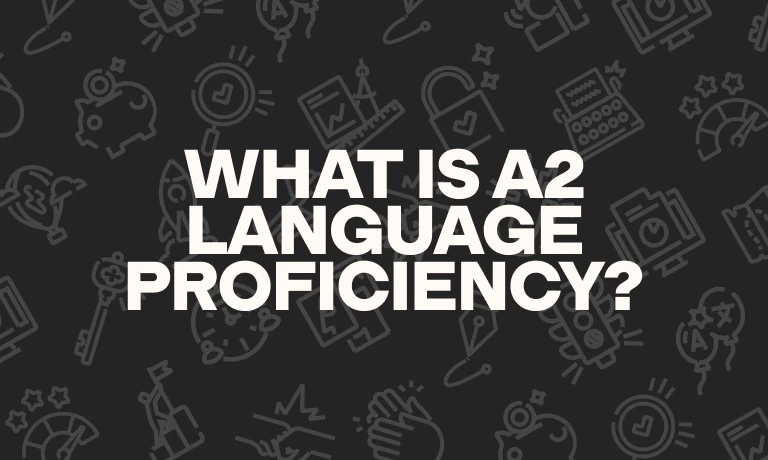There is a growing need in businesses for employees who are proficient in popular languages.
French is considered an essential business language, and the ability to speak it can be vital in the international job market.
Different roles require varying levels of language ability, and proficiency tests are essential in examining a candidate’s language skill level.
Around 29 countries have French as their official language, and there are more than 270 million French-speaking people worldwide. This indicates how vital the language is and suggests how employees with French skills help enrich the internal and external relations of organizations.
In this article, we’ll show you how to use a French proficiency test to hire top talent and reveal the benefits of incorporating one in your recruitment process.
Table of contents
- What is a French proficiency test?
- Why should you use a French language test when recruiting?
- How to test language proficiency
- What is the CEFR, and what does it have to do with French proficiency?
- What are the critical language skills in the workplace, and how are they tested?
- Use French proficient tests to hire the best
What is a French proficiency test?
A French proficiency test is a standardized assessment that examines an individual’s level of reading, comprehending, and writing French. It evaluates how well one can communicate in French in real-life situations.
French assessments typically cover topics relating to contexts such as business scenarios, grammar, and formal and informal conversations.
Why should you use a French language test when recruiting?
A French language test can evaluate many potential hires, providing comparative data for you to select the most suitable candidate. The test will show which applicants are the most proficient in French overall.
Online French tests significantly reduce the time to hire and cost per hire when you’re recruiting potential employees.
You must optimize resources when hiring. With an average cost per hire of around $4,000 in the US, using a French proficiency test in your hiring process will help minimize the amount you have to invest in recruitment.
It also enables you to eliminate unqualified candidates with insufficient language proficiency for the role. This makes your recruitment process more efficient, saving time, energy, and resources while catching out candidates who claim fluency on their CVs.
There are two ways to look at it. On the one hand, you will find it difficult as a recruiter to assess candidates’ fluency in French if you don’t speak the language. Meanwhile, a recruiter who speaks French but without specific training might struggle to evaluate the required level of a candidate.
Hence, a pre-employment test is your go-to, offering a professionally developed assessment to improve your recruitment.
The best insights on HR and recruitment, delivered to your inbox.
Biweekly updates. No spam. Unsubscribe any time.
How to test language proficiency
It’s ideal to test language proficiency precisely between the application process and the first stage interview. Usually, the interview process is time- and money-intensive, so screening candidates in advance will enable you to spend less doing interviews.
This assures you that candidates who progress are suitable for the role.
The following comprises a two-step approach for testing language proficiency:
1. Identify the required French proficiency for the role
Before measuring a candidate’s French ability, you must be clear on your expectations and identify your needs.
It’s only fair that you screen candidates at a basic level if you require basic skills and at an advanced level if that’s what you need. Clearly define your requirements for the role and test accordingly.
2. Use a professional French test
It’s easy to forget how complex a language is when it’s your official dialect. A professionally designed assessment considers cultural differences, variations of meaning, and how easily we lose depth in the translation.
Below are five primary methods of testing language proficiency:
Writing tests
This French test ensures an applicant has a firm grasp of the language and can write clear, precise sentences. It also examines their linguistic dynamics, sentence structure, and vocabulary.
Reading tests
This test focuses on an applicant’s attentiveness and logical reasoning abilities in French. In addition, it assesses how well candidates place stress on specific syllables while following standard stress patterns.
Speaking test
Here, a candidate can either record a short video responding to questions or listen and respond to a pre-recorded audio file in French. This French test examines the accuracy of word choice, pronunciation, intonation, and fluidity.
Listening test
Applicants must listen to a pre-recorded audio and correctly answer various multiple-choice questions in French. Attentiveness and comprehension are priorities here.
Translation test
This assessment examines how well an applicant understands French. Rather than a literal interpretation, a candidate will convey in French the meaning of sentences in another language.
What is the CEFR, and what does it have to do with French proficiency?
The Common European Framework for Reference (CEFR) measures language proficiency. It’s an internationally accepted assessment standard for learners of a second language.
The CEFR divides language acquisition into six levels: A1, A2, B1, B2, C1, and C2.
Beginner (A1 and A2): Level A1 means you have a grasp of some essential words and phrases. At A2, you’re able to take part in simple conversations. These two levels imply that you can converse at a fundamental level and construct simple sentences.
Intermediate (B1 and B2): B1 learners can comprehend the general ideas behind short stories like news clips or short movies. B2 learners, on the other hand, have a firm grasp of the language. At this level, speakers can visit a French-speaking country and converse adequately and independently.
Proficient (C1 and C2): A French C1 speaker is fluent and can live in a francophone country easily. C2 learners have a near-native understanding of French.
They also understand the cultural nuances of living long-term in a French-speaking country. Their command of French is such that there are no communication barriers, and they can navigate complex language situations.
TestGorilla’s language tests include the following French proficiency tests:
What are the critical language skills in the workplace, and how are they tested?
Depending on the role you are hiring for, some skills may be more important than others.
However you choose to test candidates’ French proficiency, ensuring it reflects how they will use their language skills in the role is paramount.
There are four critical language skills: listening, speaking, writing, and reading. Applicants should generally be adept at all four to be suitable for the position.
1. Listening
Listening is a critical part of communication as it describes the ability to understand the information others deliver to them in various circumstances, including a phone conversation, zoom call, and presentation.
Some French listening tests require candidates to understand complex topics and terminologies or even different French accents.
Usually, listening tests go two ways: either a recorded voice track followed by a few questions or a video call conversation.
2. Speaking
When testing a candidate’s language proficiency, speaking ability is a primary concern. This is crucial for circumstances in which the applicant will have to communicate with your clients verbally and discuss a particular topic at length.
You can assess this skill by asking candidates to send a short video of themselves stating why you should consider them for the role.
3. Reading
You can test your candidate’s reading skills by presenting them with written information or multiple-choice questions that test their understanding of the French language.
If they can read, assimilate, and respond to written texts, they likely possess the phonics and word recognition abilities to perform effectively on the job.
4. Writing
Potential candidates must be able to express ideas clearly in writing. Writing skills are in demand in every industry, regardless of the language.
Furthermore, a well-constructed French text will enable you to reach a wider audience. Applicants with excellent writing skills may also prove to be reliable international representatives for your organization.
Use French proficient tests to hire the best
French tests online give you an idea of a candidate’s skill set and help you streamline your recruitment process.
With companies now hiring remotely, recruiters must find new ways of ensuring quality with little to no face-to-face contact with candidates.
Candidates usually work through questions that test their knowledge of French, focusing on vocabulary, spelling, reading, comprehension, and common phrases.
Like any high-quality language assessment, TestGorilla’s French proficiency tests focus on the CEFR.
Signing up with TestGorilla is the first step to improving your recruitment process and assessing the value applicants can bring to your business with their knowledge of French.
You've scrolled this far
Why not try TestGorilla for free, and see what happens when you put skills first.

















